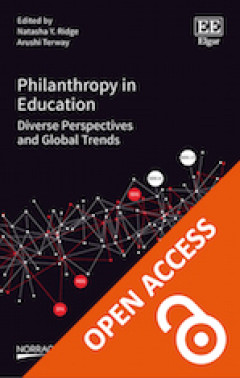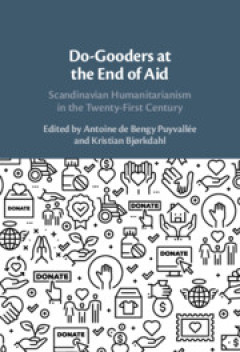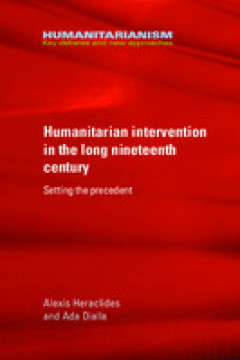Ditapis dengan

Global humanitarianism and media culture
There is as yet no collection that examines the longer histories of global humanitarianism and media culture, which would enable readers to consider the various continuities, as well as the differences, characterising the mass media’s relationship with international humanitarian crisis and relief. This collection examines this relationship from the 1950s to the present, from Marshall Plan doc…
- Edisi
- -
- ISBN/ISSN
- 9781526117298
- Deskripsi Fisik
- -
- Judul Seri
- -
- No. Panggil
- 306.4 LAW g

The ethics of medical data donation
This open access book presents an ethical approach to utilizing personal medical data. It features essays that combine academic argument with practical application of ethical principles. The contributors are experts in ethics and law. They address the challenges in the re-use of medical data of the deceased on a voluntary basis. This pioneering study looks at the many factors involved when indi…
- Edisi
- -
- ISBN/ISSN
- 9783030043636
- Deskripsi Fisik
- x, 198p. : ill.
- Judul Seri
- -
- No. Panggil
- 174.29069 ETH e

Mapping crisis:participation, datafication and humanitarianism in the age of …
The digital age has thrown questions of representation, participation and humanitarianism back to the fore, as machine learning, algorithms and big data centres take over the process of mapping the subjugated and subaltern. Since the rise of Google Earth in 2005, there has been an explosion in the use of mapping tools to quantify and assess the needs of those in crisis, including those affected…
- Edisi
- -
- ISBN/ISSN
- 9781912250387
- Deskripsi Fisik
- xviii, 259p.: ill
- Judul Seri
- -
- No. Panggil
- 526 MAP m

Philanthropy in education:diverse perspectives and global trends
Challenging commonly held perceptions of philanthropic organisations, this book brings together a range of interdisciplinary contributors from across the globe to explore the most pressing issues facing those working in and with philanthropy and education. It focuses on the increasing influence of new philanthropic actors on the global education sector, offering a thorough insight into the topi…
- Edisi
- -
- ISBN/ISSN
- 9781789904116
- Deskripsi Fisik
- 232 p.; 22 cm
- Judul Seri
- -
- No. Panggil
- 361.74 PHI p

Do-gooders at the end of aid :scandinavian humanitarianism in the twenty-firs…
Scandinavian countries are routinely considered exceptional for their commitment to development cooperation, peace mediation, and humanitarian action. This book highlights how the political culture of Scandinavia is indeed characterized by the idea of doing good on the world stage, but then shows how this 'Scandinavian humanitarian brand' is an asset that policymakers and others can capitalize …
- Edisi
- -
- ISBN/ISSN
- 9781108772129
- Deskripsi Fisik
- xix, 296 p. ; ill
- Judul Seri
- -
- No. Panggil
- 361.260948 PUY d

Do-gooders at the end of aid :scandinavian humanitarianism in the twenty-firs…
Scandinavian countries are routinely considered exceptional for their commitment to development cooperation, peace mediation, and humanitarian action. This book highlights how the political culture of Scandinavia is indeed characterized by the idea of doing good on the world stage, but then shows how this 'Scandinavian humanitarian brand' is an asset that policymakers and others can capitalize …
- Edisi
- -
- ISBN/ISSN
- 9781108772129
- Deskripsi Fisik
- xix, 296 p. ; ill
- Judul Seri
- -
- No. Panggil
- 361.260948 PUY d

Humanitarian Intervention In The Long Nineteenth Century
This book is a comprehensive presentation of humanitarian intervention in theory and practice during the course of the nineteenth century. Through four case studies, it sheds new light on the international law debate and the political theory on intervention, linking them to ongoing issues, and paying particular attention to the lesser known Russian dimension. The book begins by tracing the gene…
- Edisi
- -
- ISBN/ISSN
- 9780719098598
- Deskripsi Fisik
- Knowledge Unlatched (KU)
- Judul Seri
- -
- No. Panggil
- -
 Karya Umum
Karya Umum  Filsafat
Filsafat  Agama
Agama  Ilmu-ilmu Sosial
Ilmu-ilmu Sosial  Bahasa
Bahasa  Ilmu-ilmu Murni
Ilmu-ilmu Murni  Ilmu-ilmu Terapan
Ilmu-ilmu Terapan  Kesenian, Hiburan, dan Olahraga
Kesenian, Hiburan, dan Olahraga  Kesusastraan
Kesusastraan  Geografi dan Sejarah
Geografi dan Sejarah